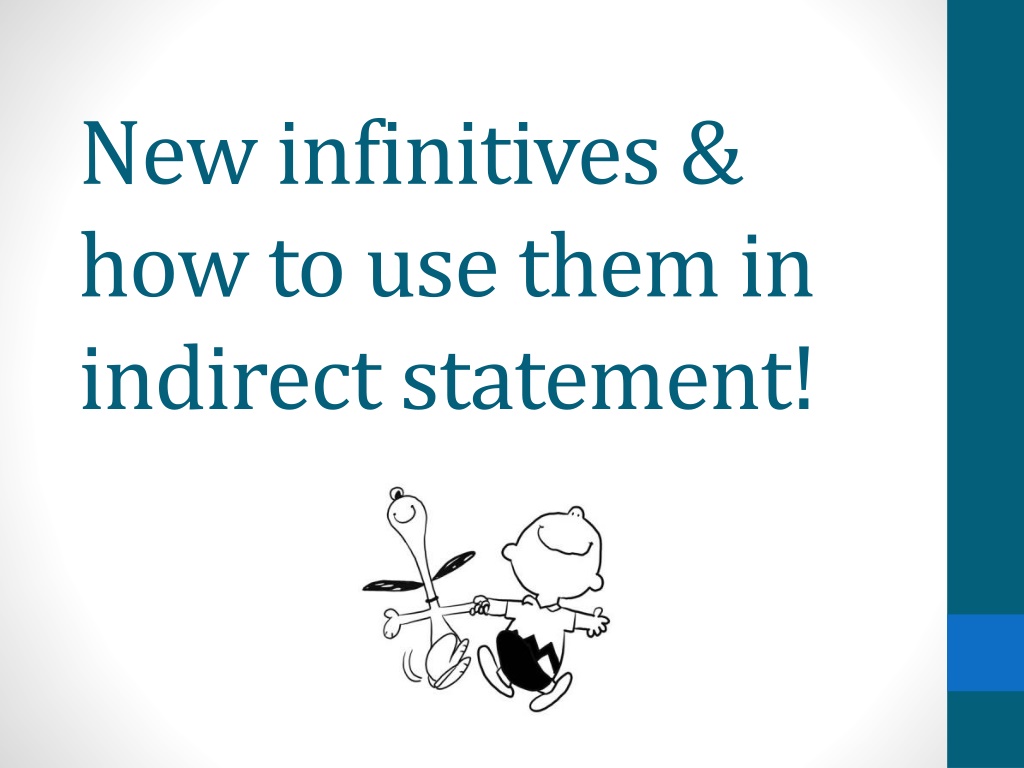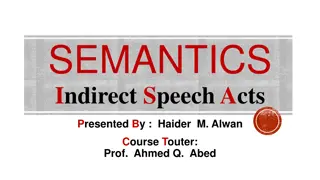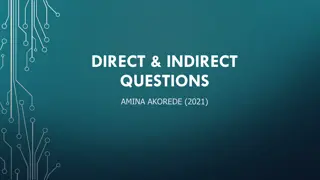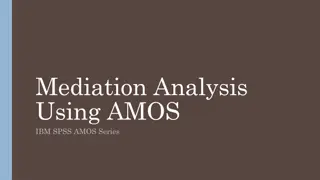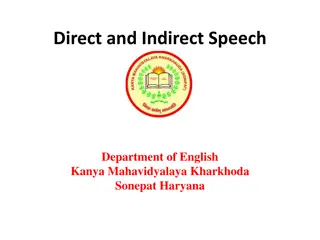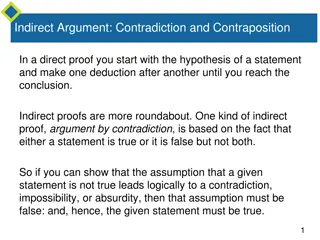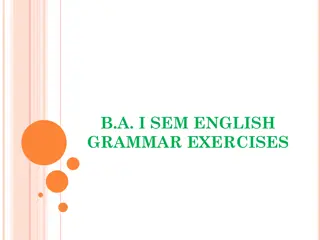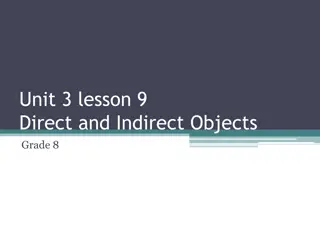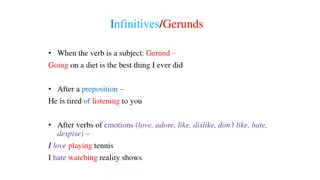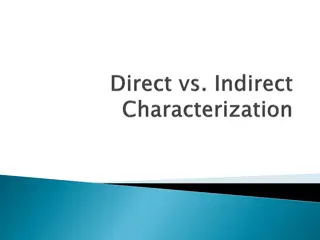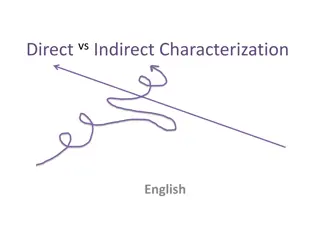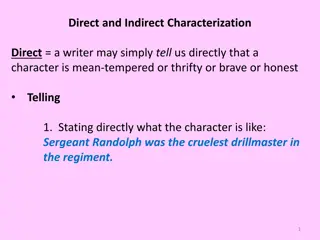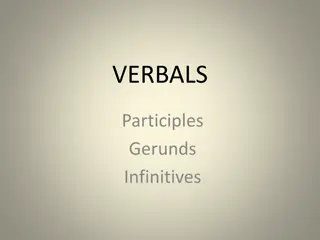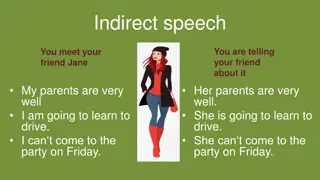Infinitives in Indirect Statement
Infinitives are versatile tools in forming indirect statements. Learn how to employ present active, perfect passive, future active infinitives, and more. Discover the nuances of creating and using different infinitive forms for diverse expressions. Explore examples and understand the essence of indirect statements in Latin grammar.
Download Presentation

Please find below an Image/Link to download the presentation.
The content on the website is provided AS IS for your information and personal use only. It may not be sold, licensed, or shared on other websites without obtaining consent from the author.If you encounter any issues during the download, it is possible that the publisher has removed the file from their server.
You are allowed to download the files provided on this website for personal or commercial use, subject to the condition that they are used lawfully. All files are the property of their respective owners.
The content on the website is provided AS IS for your information and personal use only. It may not be sold, licensed, or shared on other websites without obtaining consent from the author.
E N D
Presentation Transcript
New infinitives & how to use them in indirect statement!
To review: PRESENT ACTIVE INFINITIVES 2NDPRINCIPAL PARTS TO ______________ HOW TO MAKE THEM PASSIVE: FOR 1ST, 2ND, & 4TH TAKE OFF THE E & CHANGE TO I HAB RE >>> HAB RI PUNIRE >>> PUN RI FOR 3RD& 3RDIO TAKE OFF ERE & CHANGE TO I MITTERE>>> MITTI CAPERE >>> CAPI TO BE _______________ ED
NEW INFINTIVES! THE PERFECT ACTIVE INFINITIVE GO TO 3RDPRINCIPAL PART & FIND PERFECT STEM MITTERE > M S > M S- TO THAT STEM, ADD ISSE M SISSE TO HAVE SENT TO HAVE ______________ED As a complementary infinitive, it works well with debe , deb re: Debe donum m sisse sed n n id m s . I ought to have sent a gift, but I did not send it.
PERFECT PASSIVE INFINITIVE GO TO 4THPRINICIPAL PART YOU ARE GOING TO MAKE A 2 WORD VERB FORM! USE THE PARTICIPLE IN THE NEUTER + ESSE (IF JUST INFINITIVE) MISSUM ESSE TO HAVE BEEN SENT AMATUM ESSE - TO HAVE BEEN LOVED TO HAVE BEEN __________________ ED Why should the participle be neuter? Because infinitive if you are using them as to ___ are considered neuter.
Future Active infinitive GO TO 4THPRINICIPAL PART. CREATE THE FUTURE ACTIVE PARTICIPLE BY PUTTING UR- BEFORE THE US ENDING (OR A OR UM, ETC.): AMATUS AMAT RUS MISSUS MISS RUS TO THIS PARTICIPLE, CREATE 2 WORD VERB WITH ESSE: AM T RUM ESSE TO BE GOING TO LOVE MISS RUM ESSE TO BE GOING TO SEND TO BE GOING TO _____________ IT IS EXTREMELY RARE TO USE THIS INFINITIVE OUTSIDE OF INDIRECT STATEMENT!
SYNOPSIS OF ALL THE INFINTIVES USING MITTERE: TENSE ACTIVE PASSIVE PRESENT MITTERE TO SEND MITTI TO BE SENT PERFECT MISISSE TO HAVE SENT MISSUM ESSE TO HAVE BEEN SENT FUTURE MISSURUM ESSE TO BE GOING TO SEND WILL NOT LEARN UNTIL ADVANCED LATIN STUDIES
REVIEW INDIRECT STATEMENT: Indirect statement the basic formula Above the neck verb + accusative subject + infinitive Poeta putat puellam in Rom habit re. The poet thinks that the girl lives in Rome. But now we have to learn a little more about how to translate indirect statement.
So far, indirect statement has been fairly easy. Why? Because we have only used present tense ABOVE THE NECK and a present tense infinitive. Poeta putat puellam in Rom habit re. The poet thinks that the girl lives in Rome.
We have seen something like this a couple of times in the translation: Senexput vit puellam in Rom habit re. The old man thought that the girl lived in Rome. How is this different? Put vit is perfect tense and it forces the infinitive to translate in the past tense as well!
There is a rule for why this happens in Latin: The INFINITIVES used in the indirect statement represent TIME in respect to the main verb! You already know that they don t translate like real infinitives. Now that we know PERFECT infinitives and the FUTURE infinitive, we can express this time relationship!
So here is how it works: Present infinitive = SAME TIME as main verbs Main verb + accusative subject Perfect infinitive = TIME BEFORE main verb Future infinitive = TIME AFTER main verb
Now key in a main verb, lets start with present tense: Present infinitive = SAME TIME as main verbs Vir putat puellam Perfect infinitive = TIME BEFORE main verb The man thinks that the girl Future infinitive = TIME AFTER main verb
I put in all my infinitives that I could use: habitare Vir putat puellam habitavisse The man thinks that the girl habitaturam esse
What do they mean? habitare (same time) lives Vir putat puellam habitavisse (time before) lived The man thinks that the girl habitaturam esse (time after) will live
So the infinitives must be: Main verb present habitare (same time) lives Vir putat puellam habitavisse (time before) lived The man thinks that the girl habitaturam esse (time after) will live
habitare (same time) lives Vir putat puellam habitavisse (time before) lived The man thinks that the girl habitaturam esse (time after) will live Why habitaturam?
habitare (same time) lives Vir putat puellam habitavisse (time before) lived The man thinks that the girl Has to agree with puellam! habitaturam esse (time after) will live
So the various completed indirect statements are: Vir putat puellam in Rom habit re. The man thinks that the girl lives in Rome. SAME TIME Vir putat puellam in Rom habit visse. The man thinks that the girl lived in Rome. TIME BEFORE Vir putat puellam in Rom habit turam esse. TIME AFTER The man thinks that the girl will live in Rome.
But what happens if my main verb is past tense?!?!
Then your translations of the infinitives will change. Notice the actual Latin infinitives are the same. The main verb is different. Vir put vit puellam in Rom habit re. The man thought that the girl lived in Rome. SAME TIME Vir put vit puellam in Rom habit visse. The man thought that the girl had lived in Rome. TIME BEFORE Vir put vit puellam in Rom habit turam esse. AFTER The man thought that the girl would live in Rome. TIME
Never EVER try to do this: The man thought that the girl lives in Rome. This is a HORRIBLE translation in Latin and in English and you cannot do based on what the infinitives represent!
Exempla: Meus avunculus dicit suum agrum ab agricola coli. My uncle says that his field __________ by the farmer.
